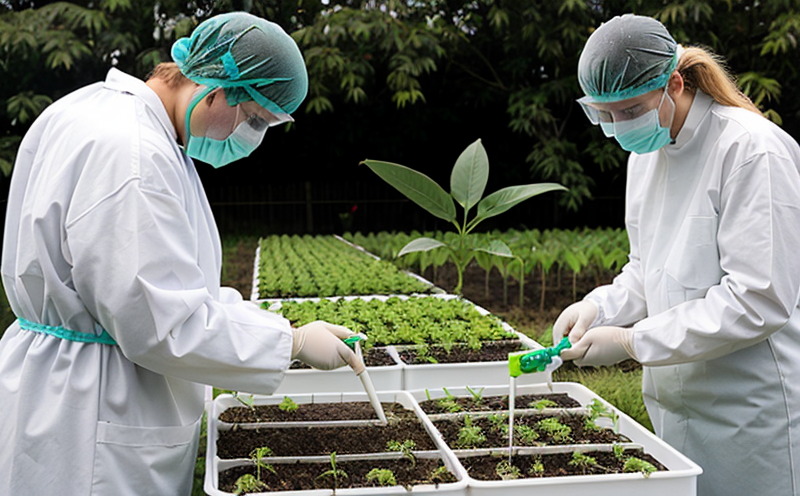Rice Tungro Virus Testing
The Rice Tungro Virus (RTTV) is a significant pathogen affecting rice crops worldwide. This virus can lead to severe yield losses, stunted plant growth, and poor grain quality. Accurate testing and early detection are crucial for managing this disease effectively. Our comprehensive Rice Tungro Virus Testing service ensures precise identification of the virus using advanced diagnostic methods tailored specifically for agricultural environments.
Our team leverages cutting-edge technologies to provide reliable results that help farmers make informed decisions promptly. By partnering with us, you gain access to expertise in plant pathology and virology, which is essential for maintaining sustainable agricultural practices. This service not only aids in preventing further spread but also supports ongoing research aimed at developing resistant varieties of rice.
Our testing process involves several steps designed to ensure accuracy and reliability. Specimens are collected under field conditions where they show symptoms indicative of RTTV infection, such as chlorotic spots or leaf discoloration patterns characteristic of the disease. These samples undergo rigorous laboratory analysis employing techniques like PCR (Polymerase Chain Reaction), ELISA (Enzyme-Linked Immunosorbent Assay), and NGS (Next Generation Sequencing).
These methods allow for highly sensitive detection of viral nucleic acids or antibodies specific to RTTV, ensuring accurate identification even at low concentrations. Our laboratory adheres strictly to international standards such as ISO 15143:2012 and EN ISO 6580-1:2017, guaranteeing consistency in our results across different samples.
Our service is particularly valuable for quality managers, compliance officers, R&D engineers, and procurement professionals involved in agricultural operations. They can rely on these tests to ensure their supply chains remain free from RTTV contamination, supporting sustainable practices throughout the food production cycle.
Scope and Methodology
| Method | Description |
|---|---|
| PCR (Polymerase Chain Reaction) | A highly sensitive method used to amplify specific segments of viral DNA. This technique allows for the detection of very small amounts of virus present in infected plants. |
| ELISA (Enzyme-Linked Immunosorbent Assay) | An immunological assay that measures the presence of antibodies against RTTV, providing a quick and easy way to screen large numbers of samples for viral infection. |
| NGS (Next Generation Sequencing) | This advanced sequencing technology offers detailed information about the genetic makeup of the virus. It helps in understanding how the virus evolves over time and aids in identifying new strains or variants. |
The testing process begins with sample collection, followed by preliminary examination to confirm visible symptoms associated with RTTV infection. Once identified as potentially infected, specimens are prepared according to established protocols before being subjected to one or more of the above-mentioned methods depending upon which will yield the most accurate results given the particular circumstances.
Our laboratory team conducts thorough analyses using these techniques ensuring high accuracy and reliability in our findings. The final step involves interpretation of data obtained from each method used, leading us to provide conclusive reports regarding RTTV presence or absence within your samples.
Benefits
- Early Detection: Enables prompt action against the virus before significant damage occurs.
- Precision Diagnosis: Provides clear evidence of RTTV infection through multiple validated diagnostic methods.
- Supports Sustainable Practices: Helps maintain healthy crops and supports long-term agricultural sustainability by preventing widespread outbreaks.
- Aids Research: Contributes valuable data to ongoing efforts aimed at developing resistant rice varieties.
- Enhances Reputation: Demonstrates commitment to high standards of quality assurance, enhancing your reputation among buyers and partners alike.
- Fulfills Compliance Requirements: Ensures adherence to local regulations concerning plant health and safety measures.
In summary, our Rice Tungro Virus Testing service provides numerous benefits that contribute directly towards improving crop yields while fostering responsible agricultural practices. By incorporating this testing into your routine protocols, you can safeguard against potential threats posed by RTTV, thereby protecting both current and future harvests.
Why Choose This Test
- High Accuracy: Utilizes multiple reliable diagnostic methods ensuring precise identification of the virus.
- Rigorous Quality Control: Adheres strictly to international standards like ISO 15143:2012 and EN ISO 6580-1:2017, guaranteeing consistent results.
- Expertise in Plant Pathology: Leverages specialized knowledge from our experienced team of plant pathologists and virologists.
- Quick Turnaround Times: Ensures timely delivery of reports allowing for rapid decision-making processes.
- Comprehensive Reporting: Provides detailed insights into the condition of your samples, offering valuable information beyond mere presence or absence of RTTV.
- Sustainability Focus: Supports sustainable agricultural practices through effective management of plant diseases like RTTV.
Selecting our Rice Tungro Virus Testing service ensures that you receive comprehensive and reliable results tailored specifically to meet the needs of your organization. Whether you're a large-scale farmer, an agricultural research institute, or simply someone looking to protect their crops from potential threats, this testing plays a vital role in maintaining healthy rice plants.





